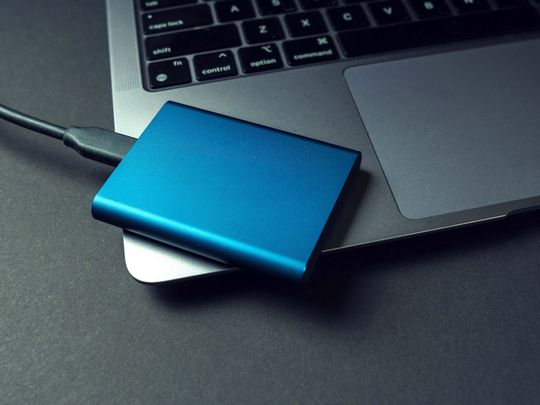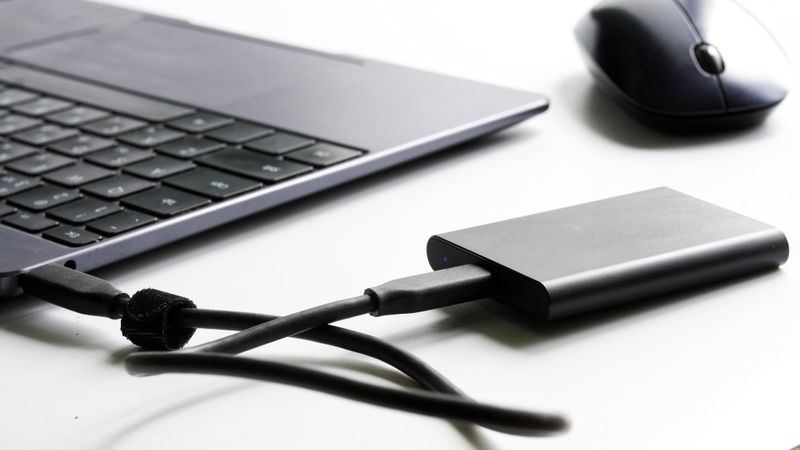
Also read:
- 7 best external hard drives in UAE, for 2024
- 5 best cheap power banks or portable chargers in UAE, for 2024
- 8 best handheld video game accessories in UAE, for 2024
- 5 best power banks for travel in UAE, for 2024
- 5 best computer monitors in the UAE, for 2024
- 5 best pre-built gaming PCs in UAE, for 2023
It’s easy enough to take a bunch of selfies and videos with friends. But over time, all that data adds up.
Before cloud storage (which can be expensive), the traditional answer to expanding storage has always been external hard drives. But there’s something that’s faster, more durable, and less bulky – solid-state drives or SSDs.
These portable devices are an excellent option if you’re looking for fast transfer speeds and reliability – in some cases, they deliver as much as 10 times the speed of portable hard drives. They’re ideal for backing up your data, and they’re smaller, slimmer, and more likely to survive falls or drops than hard drives.
We spoke with Shahbaz Khan, a systems administrator for a Canadian software company, with over 10 years of experience in the information technology (IT) industry. He advised us on the best SSDs to get, and shared how they differ from hard drives. Scroll down to read what he said.
Pick your favourite SSD from our curated list below, and get it as early as tomorrow, with Amazon Prime.
1. Best Overall: Crucial X9 Pro
Pros
- Light and compact
- IP55 rated for dust and water resistance
- Rugged design
- 256-bit encryption
Cons
- Short USB-C cable
- No USB-C to USB-A cable
Incredibly compact but still highly capable, the Crucial X9 Pro comes with a storage capacity of up to 4TB. It includes a USB 3.2 Gen 2 standard interface, which means universal compatibility with your computer, via a USB port. A 256-bit AES hardware encryption allows you to protect sensitive data on it, while IP55 water and dust resistance keeps it safe from the elements. The device is rugged, too, with its anodized aluminium body and rubberised, soft-touch base – it even has drop-proof durability of up to 7.5 feet. Reviewers attest to fast read/write speeds (of up to 1,050Mbps), and say it’s small and light enough to slip into their pockets. However, it only comes with a USB-C cable (which is too short, reviewers say), and doesn’t have a USB-C to USB-A cable or adapter.
Bonus: Buy with 0% installments and pay Dh74.92 for 12 months with select banks.
2. Best for Data Back-up: Samsung T7 SSD
Pros
- Very fast device
- Compact design
- Good security and fingerprint access
- Wide compatibility
Cons
- Durability concerns
With over 31,000 4.7-star ratings, Samsung’s beloved T7 SSD is packed full of useful features. First, its speed is fantastic – it features read speeds of up to 1,050Mbps and write speeds of up to 1,000Mbps, making it a great option if you want to back up or access files in a hurry. Although this version has 1TB of storage, the device also has configurations of up to 4TB. Its built-in security includes AES 256-bit encryption, along with a fingerprint sign-in option that you can set up as an added layer of protection. The SSD is compatible with a range of devices, including PC, Mac and gaming consoles, and has both USB-C to USB-C, and USB-C to USB-A cables included in the box. Do note that although its solid aluminium unibody construction helps protect it from falls of up to six feet, the device is not IP rated for dust and water resistance.
3. Best for Gaming: Western Digital P50 Game Dock
Pros
- Extremely fast speeds
- Easy to set up
- Multiple connectivity options
- RGB lighting included
Cons
- Emits noise even when computer is off
With its ribbed sides and hex screws, and bulky shape, the WD P50 can be deceptive in its appearance. There’s no reason for concern, however; this portable SSD packs powerful features in its boxy frame. The SSD uses NVMe (nonvolatile memory express) – a new storage access and transport protocol that delivers high throughput and fast response times – so it reaches peak read speeds of up to 3,000Mbps and write speeds of 2,500Mbps, making it the perfect storage drive to supplement your gaming PC. Connectivity is streamlined, thanks to a single Thunderbolt 3 cord, which links your laptop to an additional screen in up to 5K 60Hz. The Game Dock also has multiple ports, including two USB-C and three USB-A access points, to connect all your peripherals. Reviewers love the fully customisable RGB lighting in this device, which can be controlled via the WD_Black Dashboard. Some reviewers note, however, that the device produces a whirring noise, even when their console or computer is turned off.
Bonus: Buy with 0% installments and pay Dh74.92 for 12 months with select banks.
4. Best Portable: Kingston XS2000 SSD
Pros
- Small, compact
- Excellent transfer speeds
- IP55 rating
Cons
- Inconsistencies in speed noted by reviewers
So small, it could pass for a keychain, Kingston’s XS2000 is an external SSD that’s all the more impressive for the number of features it holds in its compact frame. This pocket-sized drive is just 2.5 inches long, and weighs 29g, but uses USB 3.2 Gen 2x2 technology to generate industry-leading read/write speeds of up to 2,000Mbps. Reviewers claim they have successfully transferred 8GB files in mere seconds, thanks to this ultra-fast device. You can pick from 500GB, 1TB and 2TB storage capacities, and store all your hi-res images, 8K videos and other large files in a flash. The SSD is IP55 rated for water and dust resistance, and is shockproof, thanks to a rubber sleeve that is removable. Do note, however, that it needs a system that’s compatible with USB 3.2 Gen 2x2 protocol, to hit its headline speed of 2Gbps, otherwise the speed is likely to drop.
5. Best Budget: SanDisk Extreme Portable SSD
Pros
- Excellent transfer speeds
- IP55 water and dust protection rating
- Good security features
- Compact and durable build
- Handy carabiner loop
Cons
- USB-C port is unprotected
An excellent, affordable option that can be fastened to your backpack or belt via its carabiner loop, SanDisk’s Extreme Portable (2nd Gen) cannot be dismissed. This SSD uses NVMe performance to get read speeds of up to 1,050Mbps and write speeds of 1,000Mbps – that’s twice as fast as its previous iteration. Its IP55 water and dust resistance, two-metre drop protection, and durable silicon shell make it a rugged and durable device that can handle jolts and falls. You can keep your content private through password protection, with its 256-bit AES hardware encryption. Do note, however, that it lacks a port cover, which can be a problem if it falls into water or collects dirt. Still, photographers and videographers in the comments rave about this SSD, saying it has cut down their content transfer time by hours.
What makes SSDs different from hard drives?

Of all the components in a personal computer, the storage drive tends to be the slowest. Your CPU (central processing unit) and GPU (graphics processing unit), for instance, take a fraction of the time to process the information that’s eventually transferred by your storage drive. So, if it doesn’t perform well, you can expect bottlenecks and backlogs – and that’s not a fun experience, by any means.
This is where SSDs come in. Unlike hard drives, which store data on spinning metal platters that are accessed by a moving magnetic head, SSDs use flash-memory cells to save data, similar to the silicon that composes a computer’s RAM (random access memory). This makes them more durable – even if you drop an SSD while it’s reading or writing data, there’s no risk that your files will become corrupted.
Khan highlighted other differences: “Hard drives offer more storage space at a cost-effective price, unlike SSDs, which can get very expensive. On the other hand, they are slower because of their mechanical parts, and more fragile.”
Hard drives, then, are best used for pictures and videos if you’re comfortable with storing, and then forgetting about it, in a drawer of your desk. SSDs, however, can come along with you on your travels, and be more likely to withstand any kind of movement, shock or fall.
These devices also make more sense than cloud storage, according to our expert.
Khan said: “SSDs are extremely useful for people in IT or for people who work in media or produce audiovisual content – their videos are often huge, in gigabytes rather than megabytes. You would pay a lot to access such heavy files over the cloud, and the speed may also not be conducive. SSDs can be expensive, but they are a one-time cost, unlike cloud storage subscriptions.”
What features should I look out for, when buying an SSD?
Depending on what you’re using the SSD for, it’s important to learn whether the device is equipped with enough space, and is fast enough for your requirements.
External SSDs use one of two internal ‘bus types’ that essentially dictate its peak speed: Serial ATA (SATA) or PCI Express (PCIe). While the former tends to be cheaper, it’s also slower, but can still work well for everyday applications. SATA-based devices also tend to top out at a maximum of 500Mbps for read/write speeds. So, if you’re going to be transferring large files (like videos) frequently, it may be best to splurge on a PCIe-based external SSD – these drives can achieve speeds of 800Mbps or higher.
Khan also suggests checking whether the SSD has the right type and number of USB ports you require to connect your devices. A USB 3.0 port, for instance, is essential.
Another factor to consider is how rugged the drive is – some even meet military standards for shock and dust protection, while others are Ingress Protection (IP) rated. It’s worth getting a device with the best possible durability, especially if you intend to use it while travelling.
Our recommendations are independently chosen by Gulf News editors. If you decide to shop through links on our website, we may earn an affiliate commission, as we are part of Amazon Services LLC Associates Program.










